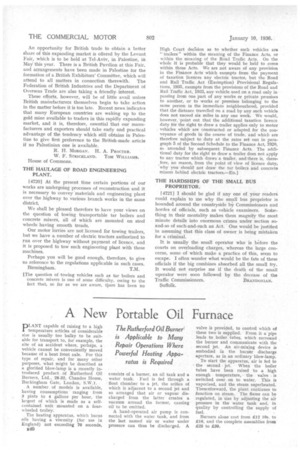A New Portable Oil Furnace
Page 58

If you've noticed an error in this article please click here to report it so we can fix it.
The Rutherford Oil Burner is Applicable to Many Repair Operations Where Powerful Heating Appa ratus is Required
pLANT capable of raising to a high temperature articles of considerable size is usually too bulky to be suitable for transport to, for example, the site of an accident where, perhaps, a vehicle cannot be conveniently moved because of a bent frOnt axle. For this type of repair, and for many other purposes, what might be described as a glorified blow-lamp is a recently introduced product of Rutherford Oil Burners, Ltd., 28-32, Ghandos House, Buckingham Gate, London, S.W.1.
A number, of models is available, having consumptions ranging from 3 pints to 4 gallons per hour, the largest of which is made as a selfcontained unit mounted on a four
heeled trolley.
The heating apparatus, which burns oils having a viscosity (for use in England) not exceeding 70 seconds,
E40
consists of a burner, an oil tank and a water tank. Fuel is fed through a float chamber to a jet, the orifice of which is adjacent to a second jet and so arranged that air or vapour discharged from the latter creates a vacuum around the former, causing oil to be emitted, A hand-operated air pump is connected with the water tank, and from the last named air or water under pressure can thus be discharged. A valve is provided, to control which of these two is supplied. From it a-pipe leads to boiler .tubes, which surround the burner and communicate with the second jet. An air-mixing device is embodied in the burner discharge aperture, as in an ordinary blow-lamp.
To start the apparatus, air is fed to the second • jet. When the boiler tubes have been raised to a high enough temperature, the valve is switched over on to water. This is vaporized, and the steam superheated. Thenceforward, the plant continues to function on steam. The flame can be regulated, in size by adjusting the air pressure in the water tank and, in quality by controlling the supply of fuel.
Burners alone cost from £12 10s. to 216, and the complete assemblies from £25 to £30.




































































































